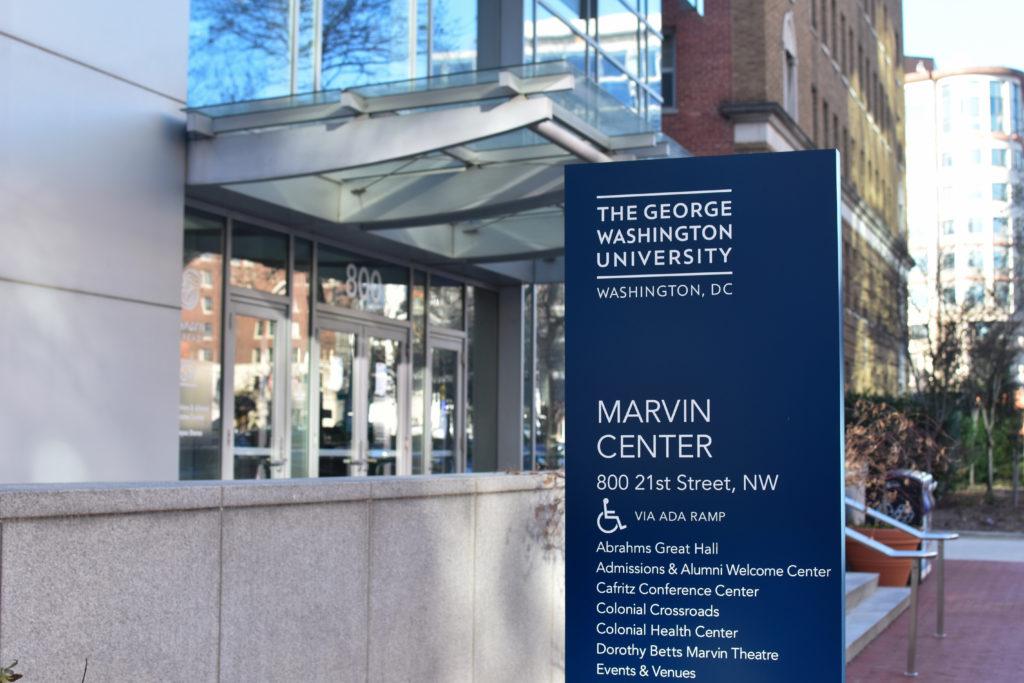Student leaders are hosting a conference on health-related issues pertaining to the LGBTQ community Saturday.
The conference, which will take place starting at 9:30 a.m. in the Marvin Center, will feature a town hall and presenters from the National LGBTQ Task Force and the non-profit health center Whitman-Walker Health. Hannah Edwards, the Student Association’s vice president for diversity and inclusion, said the conference will allow LGBTQ students to ask questions about wellness issues related to their identity and teach students how to advocate for the LGBTQ community.
Student organizers chose the theme “We’re Still Here” for the event to highlight the ramifications of anti-LGBTQ public health policies and the community’s resilience in the face of regressive legislation. Edwards added that the conference aims to address student concerns about the scope of the Colonial Health Center’s treatment options for LGBTQ students.
“I thought that it would be good to have some type of opportunity for students who are a part of the LGBT community to be able to come and learn about health services and health advocacy,” she said.
The conference will feature speakers on topics like sexual health and the push to decriminalize HIV on college campuses, Edwards said. Criminal laws related to HIV often require individuals diagnosed with HIV to disclose their HIV status to sexual partners even when there is a negligible risk of transmitting the virus, according to the American Psychological Association.
She added that the event will feature a town hall discussion with CHC staff to inform LGBTQ students about the health services that are covered by GW’s student health insurance plan, which roughly 30 percent of undergraduates use.
Student leaders are partnering with several organizations to host the event. The Columbian College’s LGBT Health Policy and Practice Program will fund the conference’s keynote speaker, who has not yet been announced, and NuVegan Café will provide lunch, Edwards said.
Edwards added that Whitman-Walker Health will provide a free HIV testing service for attendees starting at 10 a.m. on the day of the conference.
She said she conceived the idea for the conference after participating in the psychology department’s “Health Promotion in Underserved Communities” summer institute, which examines how diversity-related factors influence health outcomes. The two-month summer institute helps host an annual LGBTQ health forum at the University, which Edwards said she wanted to replicate in a student-run conference.
“I think that it could start a movement on campus where instead of people talking about everything that needs to change and stuff like that, that we really just see that we can take that initiative ourselves,” she said.
Edwards said she hopes the conference will become an annual event, adding that she has been trying to connect the conference to a specific GW office, like the Multicultural Student Services Center’s LGBTQIA Resource Center.
Bridget Carl, the SA’s director of student health services, said she hopes the conference includes a discussion of trans and non-binary identities, which she said receive less recognition in conversations about LGBTQ health. Carl added that dialogue about health in the LGBTQ community focuses intensely on HIV and AIDS, overlooking other health issues pertaining to the community.
“I oftentimes am frustrated in how little we talk about that – this whole community,” Carl said. “And if we do talk about it, it’s again, far too often focused on HIV/AIDS, which I can understand because D.C. has a big HIV/AIDS problem – but there’s a lot more to it.”
Despite a 74 percent decline in the number of new cases between 2007 and 2016, youth between 13 and 24 years old are still diagnosed with HIV at twice the national rate, according to D.C. Department of Health. About 12,000 people in D.C. are HIV-positive – nearly 2 percent of the population – according to an annual health department report.
Carl added that she hopes students of all backgrounds will attend the conference, particularly those planning to work in health care or the health care policy space in the future.
SA President SJ Matthews said students will learn how to advocate for LGBTQ individuals at the conference, in addition to learning about health issues in the community.
“I think the conference is important in order to create a space for members of the LGBTQIA+ community to come together and discuss health and wellness as a group,” she said in an email. “It’s going to be a great experience for anyone at GW, and I’m excited to have some great conversations with members of the GW community.”
SA Sen. Brandon Hill, CCAS-U, said the conference will provide a dedicated space for LGBTQ individuals to receive information about health-related issues, adding that the conference will increase LGBTQ visibility on campus.
“Today’s climate deeply stigmatized members of the LGBT+ community and discourages them to ask questions about their mental, physical and sexual health,” Hill said in an email. “The conference fosters a place that will allow those questions to be asked freely and answered honestly.”





